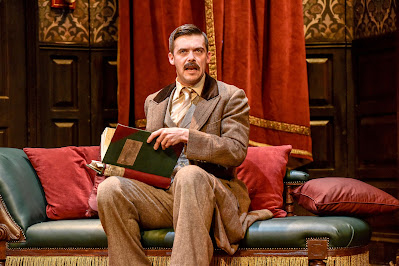Curve, Leicester
Friday 22nd
July 2022
‘Solidarity forever!’
Following the success of recent productions such as Beautiful, A Chorus Line, and a summer run in the West End for their 2016
production of Grease, Curve is currently
setting the standard for post-covid theatre, with a cleverly curated season
that’s captivating audiences nation-wide. Their latest delight is a timely
revival (the first since the original production) of Lee Hall and Elton John’s Billy Elliot The Musical. Nikolai Foster’s
vision beautifully evokes a sense of community against a delicately balanced
backdrop of political and emotional turmoil.
The story of a young boy pursuing his passion for dance,
while battling prejudice and the hardships suffered by working class families
during the 1984 Miners Strike is a modern classic, yet Foster’s production
mines new depths, creating a moving and visually imposing piece of theatre.
Michael Taylor’s set exploits the sheer expanse of Curve’s stage, upon which
looming scaffold structures and mine shaft-yellow cages evoke a perilous playground
of industrial dangers and suburban class hostilities. Foster juxtaposes this
adult world in which tensions frequently escalate into bone-rattling violence with
the exuberant world of the young boxers and dancers. Edd Lindley’s colourful
costumes and Lucy Hind’s playful choreography featuring the children jumping
out of lockers during ‘Expressing Yourself’ is a perfect example of such youthful
innocence which is completely at odds with the social suppression of the
external political landscape of the time. These worlds collide even further
during the thrilling ‘Solidarity’, as the ballet dancers become surrounded by
warring strikers and policemen in a whirling crescendo of commotion.
Yet such juxtaposition is also used to great effect to
emphasise the theme of community in Billy
Elliot. The children and adults frequently share the stage, inextricably
fusing the political with the personal, as families struggle to make ends meet.
A fine example of this is the opening of Act 2 which sees the locals gather for
a shoestring Christmas celebration; the audience resume their seats while the
characters sing, laugh and dance together in a tableau of nostalgic warmth. The
fact that Foster and co have once again harnessed the talents of the Curve
Young Company to bulk out the group scenes adds an extra layer of authenticity
to the communal quality of the piece. The jaunty medley of 80’s festive hits
soon gives way to the cracking satirical number, ‘Merry Christmas, Maggie
Thatcher’ which combines family-friendly pantomime aesthetics with a biting
undercurrent of bile. Subsequently the comedy descends into more heartfelt
sentiment with Jackie Elliot’s folksy ode to his lost wife and lost livelihood, ‘Deep
Into The Ground’. As such this scene traverses the gamut of human emotion and exquisitely
encapsulates the thematic complexities of the show in a single ten-minute
sequence; from the communal heart and resilience, to political fury and
personal grief – all delivered with a deliciously traditional British timbre
ranging from irony to pathos.
The performances are uniformly outstanding. Sally Ann
Triplett was born to play the acerbic yet maternal Mrs Wilkinson, and she
relishes every exasperated rebuke levelled towards her gaggle of giggling dancers
and has a ball with the Chicago
inspired choreography for ‘Shine’. Joe Caffrey’s earthy portrayal of Billy’s
Dad, Jackie Elliot, grounds the show in a realism that makes the audience care
for the family and mining community. Ethan Shimwell shines as Billy’s best
friend, Michael, displaying natural comic timing and infectious enthusiasm. And
finally, Alfie Napolitano gives the performance of his life as young Billy. He
captivates the audience from the get-go, but it’s his performance of ‘Electricity’
that especially wows; his grasp of the choreography is superb, as expected, but
it is in the small emotional nuances that Napolitano really tugs at the
heartstrings – for example, the brief pause and glance towards his Dad before
taking his final series of pirouettes – the performance elicited a rare and
deserved mid-show standing ovation.
Curve has created a production which affords Billy Elliot both the immense spectacle
and touching intimacy it deserves. The image of Billy dancing alone, dwarfed
upon the vast metallic tangle of the stage, is unexpectedly moving, while the
group numbers involving the miners singing for their lives are rousing yet
prophetic in their ominousness. Foster and co have injected the musical with
new vitality and far-reaching impact that will affect young and old alike. The
revival comes at a time in history where Britain faces a similar state of
economic and political crisis, and it admirably demonstrates the capacity of
the arts to truthfully reflect the cultural climate while transcending social,
physical, and linguistic boundaries to express both individual and collective anger,
grief and joy.
Billy Elliot plays at Curve until 20th
August 2022.



,%20Natalie%20Casey%20(Mel)%20in%20PAPER%20Photo%20by%20Johan%20Persson.jpg)
%20and%20Eithne%20Browne%20(Maggie)%20in%20Maggie%20May%20at%20Leeds%20Playhouse.%20Photography%20by%20Zoe%20Martin%20(1).jpg)


